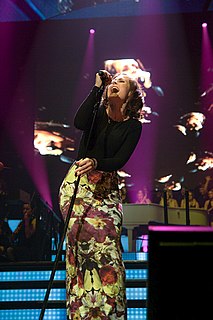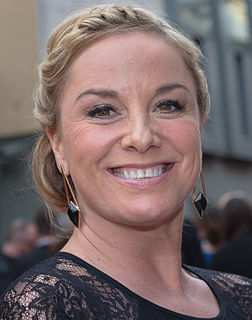A Quote by Olga Tokarczuk
A novel should tell a story, be a pleasure to read, and at the same time it should be thought-provoking, even a bit instructive.
Related Quotes
Your opening should give the reader a person to focus on. In a short story, this person should turn up almost immediately; he should be integral to the story's main action; he should be an individual, not just a type. In a novel, the main character may take longer to appear: Anna Karenina doesn't show up in her own novel until chapter eighteen.
It thought about the magic that happens when you tell a story right, and everybody who hears it not only loves the story, but they love you a little bit, too, for telling it so well. Like I love Ms. Washington, in spite of myself, the first time I heard her. When you hear somebody read a story well, you can't help but think there's some good inside them, even if you don't know them.
If you wait until you got time to write a novel, or time to write a story, or time to read the hundred thousands of books you should have already read - if you wait for the time, you will never do it. ‘Cause there ain’t no time; world don’t want you to do that. World wants you to go to the zoo and eat cotton candy, preferably seven days a week.
The point is, that the function of the novel seems to be changing; it has become an outpost of journalism; we read novels for information about areas of life we don't know - Nigeria, South Africa, the American army, a coal-mining village, coteries in Chelsea, etc. We read to find out what is going on. One novel in five hundred or a thousand has the quality a novel should have to make it a novel - the quality of philosophy.
For those interested in Reformed thought more broadly, I'd recommend Peter Leithart's recent book on Reformed Catholicism entitled, The End of Protestantism: Pursuing Unity in a Fragmented Church (Brazos Press, 2016), as a thought-provoking and stimulating read that should get us all thinking about the future shape of the Church, wherever we come from.
I've often made revisions at that stage that turned out to be mistakes because I wasn't really in the rhythm of the story anymore. I see a little bit of writing that doesn't seem to be doing as much work as it should be doing, and right at the end, I will sort of rev it up. But when I finally read the story again, it seems a bit obtrusive.
The average detective story is probably no worse than the average novel, but you never see the average novel. It doesn't get published. The average -- or only slightly above average -- detective story does.... Whereas the good novel is not at all the same kind of book as the bad novel. It is about entirely different things. But the good detective story and the bad detective story are about exactly the same things, and they are about them in very much the same way.






































